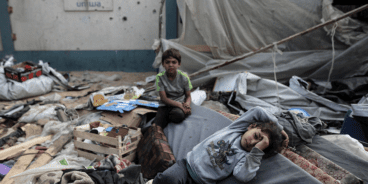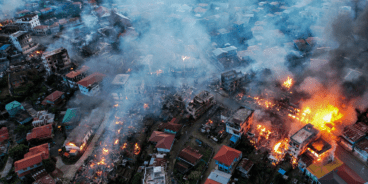
Atrocity Alert No. 83: Yemen, Myanmar (Burma) and South Sudan
Atrocity Alert is a weekly publication by the Global Centre for the Responsibility to Protect highlighting situations where populations are at risk of, or are enduring, mass atrocity crimes.
The Killing of Former President Saleh and Ongoing Atrocities in Yemen
There has been a dramatic escalation of fighting in Yemen – especially in the capital, Sana’a – since 1 December as a result of a breakdown of the military alliance between troops loyal to former President Ali Abdullah Saleh and Houthi forces. After moving against his former Houthi allies, on 2 December Saleh announced his willingness to cooperate with the Saudi Arabia-led international military coalition. Following intense shelling and street battles in Sana’a, on 4 December it was reported that Saleh had been killed.
Civilians continue to bear the brunt of the conflict. Ongoing clashes between Houthis and Saleh’s forces in civilian populated areas, as well as airstrikes by the Saudi-led coalition, have resulted in the death of at least 100 people over the last week and left thousands of civilians trapped in their homes. On 4 December the UN humanitarian coordinator for Yemen, Jamie McGoldrick, pleaded for a “humanitarian pause” to allow civilians to seek medical care and enable the movement of humanitarian organizations.
The intensification of armed hostilities comes amid an ongoing blockade of Yemen’s ports. Imposed by the Saudi-led coalition since 6 November, the blockade has caused critical shortages of life-sustaining supplies, including commercial imports of food and fuel. Although the blockade was partially lifted on 23 November to allow for the delivery of some humanitarian aid, Yemen imports 90 percent of its food.
Due to the blockade water networks in seven cities have run out of essential fuel and sewage networks in six cities are compromised, leaving civilians at renewed risk of cholera. Since April Yemen has experienced the largest cholera outbreak in modern history, with over 900,000 cases and 2,200 deaths. In addition, more than half of Yemen’s medical facilities are no longer functioning and more hospitals and clinics will close if fuel and water supplies are not renewed.
On 2 December the heads of seven UN agencies called for an end to the blockade, emphasizing that unless commercial imports are resumed, “the threat of widespread famine in a matter of months is very real.” Over 8 million people are currently at risk of famine in Yemen.
Indiscriminate attacks on civilians and civilian infrastructure, and deliberately depriving starving civilians of access to crucial food supplies, constitute war crimes and crimes against humanity under international law. All parties to the conflict in Yemen must prioritize the protection of civilians, and the Saudi-led coalition should immediately lift the blockade of Yemen’s ports. The UN Security Council must facilitate a sustained ceasefire and help ensure that all parties to the conflict return to substantive peace negotiations.
100 Days of Mass Atrocities in Myanmar (Burma)
Last Friday, 1 December, marked 100 days since Myanmar’s security forces began so-called “clearance operations” in northern Rakhine State. Since 25 August these operations have driven more than 620,000 refugees – mostly ethnic Rohingya – into Bangladesh. Although Bangladesh and Myanmar signed the “Arrangement on Return of Displaced Persons from Rakhine State” on 23 November, stipulating that repatriations are to begin within two months, the Office of the UN High Commissioner for Refugees has warned that conditions are not yet in place to enable safe returns.
More than 288 Rohingya villages were burned down during the “clearance operations,” and it is unclear where returnees would be housed. In addition, the Myanmar authorities deny that any human rights abuses or violations were committed by their security forces against Rohingya civilians and continue to forbid access to independent investigators. Crucially, Myanmar’s authorities have not indicated that they will provide returning Rohingya a path to citizenship or abolish existing laws that discriminate against them as a people.
Yesterday, 5 December, the Human Rights Council (HRC) held a special session on the human rights situation in Myanmar and adopted a resolution by 33 votes to 3, with 9 abstentions. The resolution emphasized the need for Myanmar to fully cooperate with UN mechanisms, particularly the HRC-mandated independent fact-finding mission.
During the session 48 member states belonging to the Group of Friends of the Responsibility to Protect issued a joint statement urging the Myanmar authorities to hold accountable those responsible for grave human rights violations and abuses in accordance with international law. In his statement to the session, the UN High Commissioner for Human Rights, Zeid Ra’ad al-Hussein, described atrocities committed against the Rohingya as possibly including “elements of genocide.”
The UN Security Council will receive another briefing on the situation in Myanmar on 12 December. The Council should impose targeted sanctions against those senior military officers with command responsibility for crimes against humanity committed in northern Rakhine State and press Myanmar to ensure that those responsible for these atrocities are held accountable. If Myanmar is unwilling to do so, the Council should refer the situation to the International Criminal Court.
Inter-communal Violence and Political Stagnation in South Sudan
Since the start of the dry season during late November, civilians have faced the heightened risk of inter-communal violence in South Sudan. According to the UN Mission in South Sudan, on 28 November armed ethnic Murle fighters attacked a Dinka village in Jonglei State. At least 45 people, including several humanitarian workers, were killed and more than 60 women and children were abducted.
The Murle and Dinka communities in Jonglei State have a long history of seasonal raids that result in cattle-rustling, kidnapping and violence. However, the proliferation of arms has enhanced the intensity and lethality of these raids and inter-communal clashes.
Ongoing conflict between the government and armed rebels has undermined attempts to prevent inter-communal violence and has fostered a climate of impunity. Two and a half years after signing an agreement to end the 2013-2015 civil war, the Intergovernmental Authority on Development is attempting to reinvigorate the peace process through a High-Level Revitalization Forum.
Friday, 15 December, will mark the fourth anniversary of the start of the civil war in South Sudan. After six years of independence and four years of recurring conflict, South Sudan’s long suffering people are still waiting for their political leaders to uphold their sovereign responsibility to protect all of the country’s diverse populations from endemic violence and mass atrocities.
Related Publications


